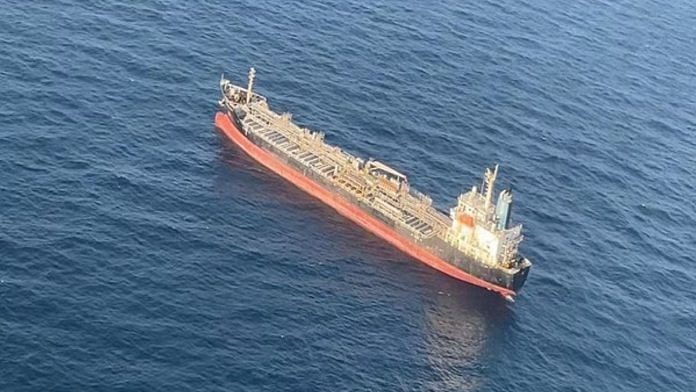The Israel-Hamas war seems to be heading toward a bigger crisis, evolving into a complicated, byzantine geopolitical situation. As a sequel to Israel’s retaliatory attacks in Gaza, the Iran-backed Houthi rebels in Yemen have joined the war by initiating a blockade of the Red Sea. What began as an attack on Israeli ships has now escalated to attacks on all cargo ships including those headed for Arab states and India.
India must move swiftly to secure alternate sea routes and strengthen its naval capabilities without being part of any international coalition. The Indian Navy cannot be put under the US Naval Command, but India should prevail upon the UN to add a navy wing to its peacekeeping structure, which could be deployed in situations like the present one where non-state actors and terror outfits are holding sea lanes of communication, international trade and energy security to ransom.
The Houthis have intensified their attacks as a show of support to Hamas, who, according to them, represent the Palestinian cause. Houthi rebels even renewed their warning to the US forces, urging them to leave the Red Sea as soon as possible. “The Red Sea will be a burning arena if America and its allies continue their bullying,” Houthi spokesperson Mohammed Abdulsalam said in a broadcast by the group’s al-Masirah TV. The warning came after the US accused Houthis of carrying out drone attacks on crude oil tankers MV Sai Baba and MV Chem Pluto. Abdulsalam refuted the allegations, blaming a US naval destroyer for the narrowly averted missile attack on Red Sea’s southern end.
Houthi, an armed militia started in the 1990s to unseat former Yemen President Ali Abdullah Saleh, is now a formidable mercenary force capable of challenging even the naval might of the US. A sub-sect of Zaidi Muslims, Yemen’s Shia minority, the group derives its name from founder Hussain al-Houthi. Just over two decades ago, this militant outfit fought and fended off the combined strength of the local army and Saudi Arabia’s support force.
Since then, there appears to be no turning back for them. Going by global news reports, the Houthis are challenging the might of the US Navy. The US coalition Operation Prosperity Guardian seems to have suffered a setback in its nascent stage.
It is a Taliban moment for the US in the Middle East. The 2014 takeover of the capital of Sanaa by the Houthis led to a total war, resulting in a severe humanitarian crisis and loss for the government. Following a 2018 ceasefire agreement brought about by the US and the United Nations, the Yemeni government withdrew from the Port of Hodeidah. This resulted in Houthis shifting their attention to the Red Sea port, through which up to 12 per cent of world trade passes, and exploiting the hub for hijacking activities and amassing military hardware.
Also read:
New crises emerging
The Shia outfit Hamas (acronym for Harakat al-Muqawama al-Islamiya), enjoys support from over a dozen non-state actors, including the Houthi and Hezbollah. Despite serious regional and sectarian differences, there is sufficient agreement and camaraderie between Hamas, Houthis, and Hezbollah against Israel.
With this ganging up of non-state actors, there appears to be no end to the conflict in the Middle East. Saudi Arabia and the United Arab Emirates (UAE) have reportedly issued an ultimatum to President Mahmoud Abbas of Palestine, who has not yet condemned the Hamas terror attack. They have directed him to dissolve his government and pave the way for a dispensation of Arab states’ choice, failing which all financial aid to the present Palestinian Authority will be stopped.
In the unlikely event of this happening, Middle East politics will witness unforeseen changes, like a two-state solution that would be much to the advantage of the Arab world’s politics and economy. Israeli Prime Minister Benjamin Netanyahu has also reportedly informed a Knesset panel that Saudi Arabia and UAE will finance the reconstruction of Gaza after Hamas is wiped out – a claim that both Arab states haven’t publicly confirmed.
Badly divided Arab states are railing against Bahrain, the only Arab state to support Prosperity Guardian—an operation that is striving to ensure the safety of navigation in the Red Sea and the Gulf of Aden in response to international demands. Contrary to earlier claims, many European Union countries, already badly hit by the Russia-Ukraine crisis, have refused or are reluctant to send in their navy to be part of a US-led coalition fearing heavy losses and economic turbulence due to the energy crisis.
Saudi Arabia would like to see the end of Houthis without participating in the US-led coalition that supports Israel, which is unpalatable for it both domestically and diplomatically. Besides, it could be under pressure from Beijing, which brought about Saudi-Iran reconciliation in March 2023. The China-Iran alliance will suffer a setback if the Saudi-Tehran peace pact is disturbed and Beijing tries to dissuade Tehran to not support the Houthis. Besides, more than 60 per cent of Chinese goods pass through the Suez Canal. Hence China has every reason to be worried about a prolonged crisis in the Red Sea.
Both the Arab world and India want the rebel forces to be defeated, sea lanes of communication to be secured and a peaceful negotiated settlement for the Israel-Palestine issue.
Energy security and unhindered international trade are inevitable for India to maintain its GDP growth momentum and move toward a $5 trillion economy.
Seshadri Chari is the former editor of ‘Organiser’. He tweets @seshadrichari. Views are personal.
(Edited by Zoya Bhatti)



